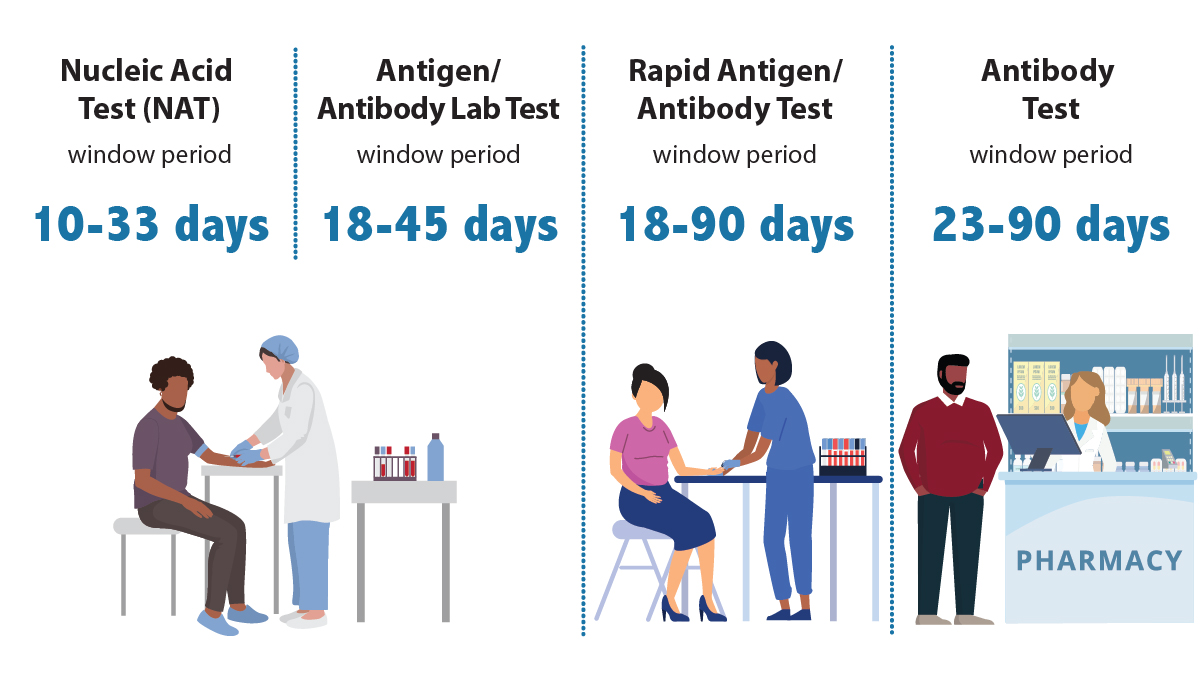Key points
- Everyone between the ages of 13 and 64 should get tested for HIV at least once.
- People with certain risk factors should get tested more often.
- Most HIV tests are available for free or at a reduced cost.
- Visit gettested.cdc.gov to find HIV testing in your area.
Why get tested
The only way to know your HIV status is to get tested. Knowing your HIV status gives you powerful information to keep you and your partner healthy. If your test result is positive, you can take medicine to treat HIV to help you live a long, healthy life and protect others. If your test result is negative, you can take actions to prevent HIV.

When to get tested
Everyone ages 13 to 64 should get tested for HIV at least once as part of routine health care.
People with certain risk factors should get tested more often. You should get tested at least once a year if:
- You’re a man who has had sex with another man.
- You’ve had anal or vaginal sex with someone who has HIV.
- You’ve had more than one sex partner since your last HIV test.
- You’ve shared needles, syringes, or other drug injection equipment (for example, cookers).
- You’ve exchanged sex for drugs or money.
- You’ve been diagnosed with or treated for another sexually transmitted infection, hepatitis, or tuberculosis (TB).
- You’ve had sex with someone who has done anything listed above or you don’t know their sexual history.
Did you know?
Gay and bisexual men
Sexually active gay or bisexual men may benefit from more frequent testing (every 3 to 6 months). Talk to your health care provider about your risk factors and what testing options are available to you.
Pregnant people
Pregnant people should get tested for HIV during each pregnancy. Testing pregnant people and treating those who have HIV is a highly effective way to prevent babies being born with HIV.
Testing results
Your test results depend on the type of HIV test and where you get tested.
- With a rapid antibody test, usually done with blood from a finger stick or with oral fluid, results are ready in 30 minutes or less. This includes HIV self-tests used at home or in a private location.
- The rapid antigen/antibody test, done with blood from a finger stick, takes 30 minutes or less.
- It may take several days to receive your test results with a NAT or antigen/antibody lab test. This includes mail-in HIV tests.
Window period
No HIV test can detect HIV immediately after infection. That’s because of the window period—the time between HIV exposure and when a test can detect HIV in your body.

The window period depends on the type of HIV test.
- Antibody tests can usually detect HIV 23 to 90 days after exposure. Most rapid tests and self-tests are antibody tests.
- A rapid antigen/antibody test done with blood from a finger stick can usually detect HIV 18 to 90 days after exposure.
- An antigen/antibody lab test using blood from a vein can usually detect HIV 18 to 45 days after exposure.
- A NAT can usually detect HIV 10 to 33 days after exposure.
If you get an HIV test after a potential HIV exposure and the result is negative, get tested again after the window period for the test you took.
After you get your results
If your test result is positive
If you use any type of antibody test and have a positive result, you will need a follow-up test to confirm your results.
- If you test in a community program or take an HIV self-test and it’s positive, you should go to a health care provider for follow-up testing.
- If you test in a health care setting or a lab and it’s positive, the lab will conduct the follow-up testing, usually on the same blood sample as the first test.
- If the follow-up test is also positive, it means you have HIV.
Receiving an HIV diagnosis can be life changing. Take time to process the news. Then, find HIV care and start treatment as soon as possible. HIV treatment can make the amount of HIV in your body so low that a test can’t detect it (undetectable viral load). Getting and keeping an undetectable viral load is the best way to stay healthy and protect others.
You should share your HIV status with your sex or needle-sharing partners. Communicating your HIV status allows each person to take steps to stay healthy.
Testing positive for HIV does not mean you have AIDS (acquired immunodeficiency syndrome), the most advanced stage of HIV disease. However, HIV can lead to AIDS if a person with HIV does not get treatment or take care of their health.
If your test result is negative
A negative result doesn’t necessarily mean that you don’t have HIV. That’s because of the window period.
- If you get an HIV test after a potential HIV exposure and the result is negative, get tested again after the window period for the type of test you took.
- If you test again after the window period, have no possible HIV exposure during that time, and the result is negative, you do not have HIV.
- If you’re sexually active or use needles to inject drugs, continue to take actions to prevent HIV.
- If you have certain risk factors, you should continue getting tested at least once a year.
Remember, your HIV test result reveals only your HIV status. If your test result is negative, that doesn’t mean your partner’s test result is negative. Consider getting tested with your partner so you can both know your HIV status and take steps to keep yourselves healthy.


